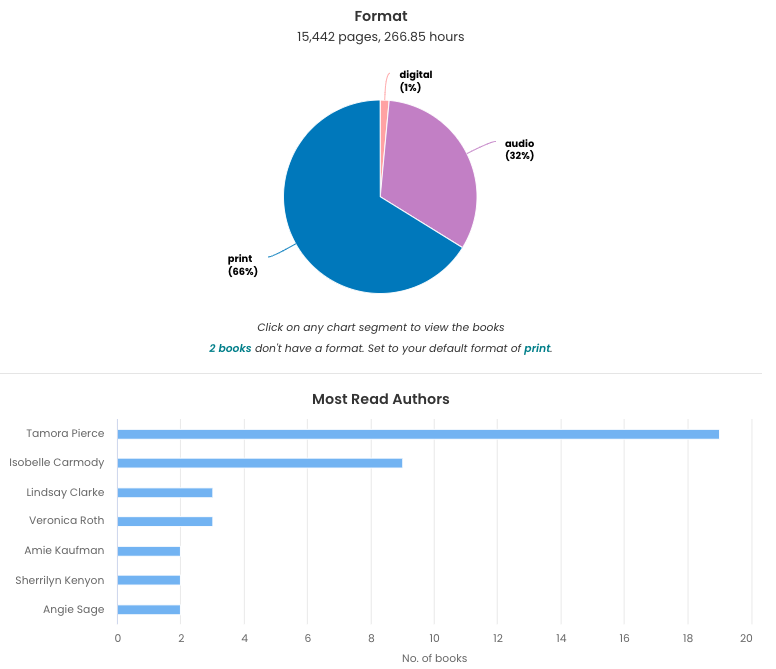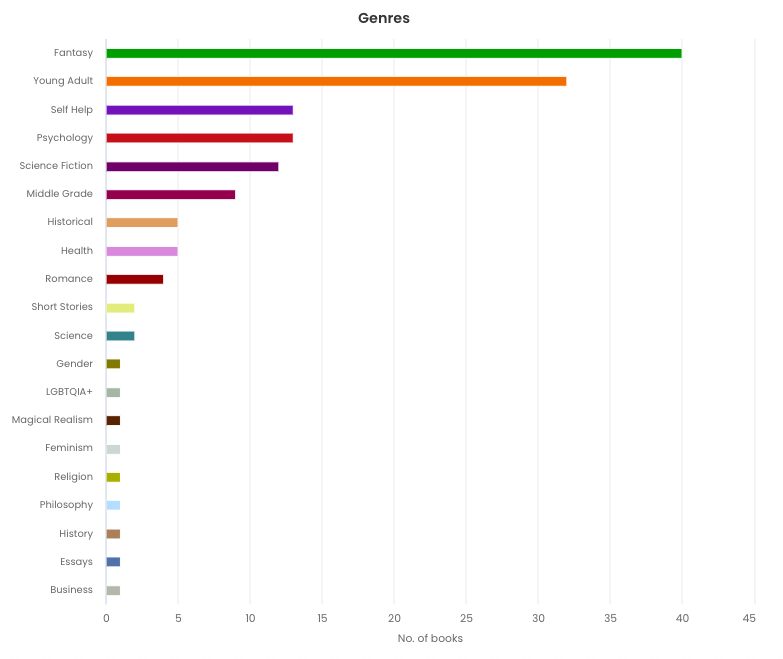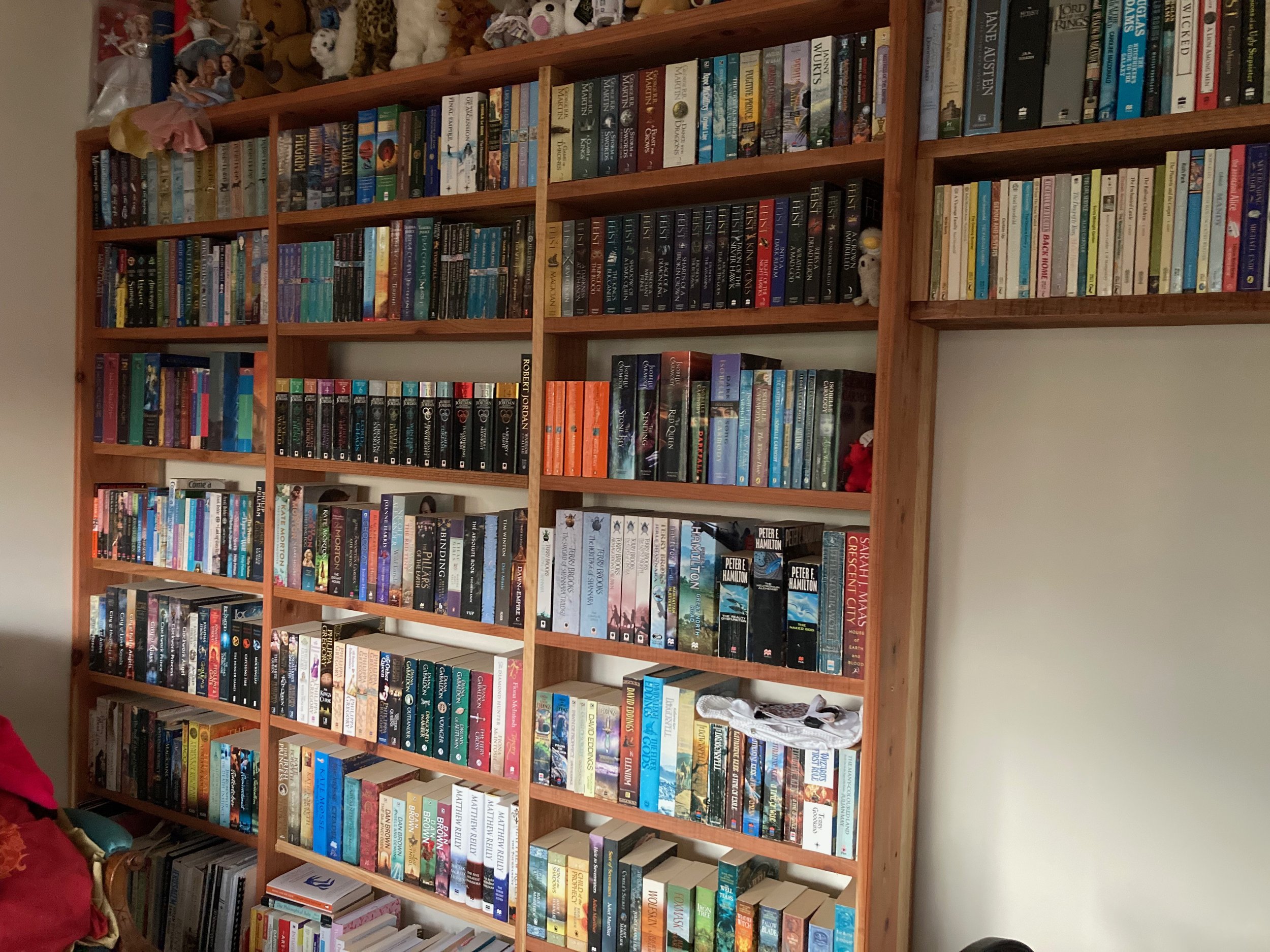Reading List 2023
In 2023 I read 68 books! That’s a huge jump from the year before.
For the past couple of years I’ve been using an app called StoryGraph to track the books I have read. It creates graphs of genres, pace, type of book (e.g. audio, physical), authors and numbers of books.
Here’s a few graphs from my reading during 2023:
Image description: a graph from the app Storygraph showing 68 books read, 25,034 pages. The pie graph shows the different moods of the different books read, each category being a different colour. The most common categories are adventurous and informative. Other categories in order of decreasing frequency are: reflective, emotional, mysterious, inspiring, hopeful, dark, challenging, lighthearted, funny and tense.
Image description: two graphs from the app Storygraph. On the top is a pie graph showing the different book formats: print - 66% (15, 442 pages), audio - 32% (266.85 hours), digital - 1%. Below this is a bar chart showing the most common authors read and how many books were read that were by that author. The largest bar is Tamora Pierce (19 books), followed by Isobelle Carmody (9), Lindsay Clarke (3), Veronica Roth (3), Amie Kaufman (2), Sherrilyn Kenyon (2) and Angie Sage (2).
Image description: a bar graph from the app Storygraph showing the different genres of books read (books can have more than one genre). The most common genre was fantasy (40 books), then young adult (32), self help (13), psychology (13), science fiction (12), middle grade (9), historical (5), health (5), romance (4), short stories (2), science (2), and 1 each from gender, LGBTQIA+, magical realism, feminism, religion, philosophy, history, essays, business.
When I say ‘read’ I include audiobooks. Most of the fiction I’ve been reading is audiobooks, as that’s what I listen to to go to sleep.
Reading was my safe space as a child. I could escape into a book and shut out the world around me. I used to read at a pace of 100 pages an hour. When my books are out and organised when I move to a new place, that is when I am home.
Doing so much forced reading for study has made it harder to read for fun and I am working on getting this back.
Also when I developed Chronic Fatigue Syndrome/Myalgic Encephalomyelitis (ME/CFS) in 2013 my reading speed dropped dramatically, to the point where I think it took me 6 months to read one book. This was incredibly frustrating for me. Since then I have embraced more audiobooks and short form content such as blogs and feel like my reading pace is slowly building up again.
I often have 2-4 books on the go at any one time. A fiction audiobook for sleep, possibly a non-fiction audiobook for long drives, and usually a hardcopy fiction and a hardcopy non-fiction book. I have a shelf next to my bed with my current and up next books, then have a floor to ceiling bookshelf in the study half of our tiny house, which I designed and my husband built.
Image description: a photo of a floor to ceiling bookshelf, full of mostly fantasy books.
————————————
People often ask for book ideas, so here’s a list of what I’ve been reading this year. I will add to it throughout the year.
Non-fiction
Neuroqueer Heresies - Dr Nick Walker
A series of short essays exploring a range of concepts related to neurodiversity with great definitions and clarification of terminology. Some interesting new concepts like Neuroqueering that resonated well with me. It felt like a deeper dive into the language and concepts that I found really useful. Academic writing style may not suit everyone.
The 1 Minute Commute - Robert Gerrish
Different to what I usually read, a book on being a sole trader and working for yourself. Really emphasises the importance of boundaries and has some good tips.
How To Be Human - Ruby Wax
I found it hard to get through the audiobook version of this. In saying that this is written in a light and fun way, covering some big topics - evolution, thoughts, emotions, the body, addictions, relationships, kids, the future and compassion.
Living Well With Pain And Illness: The Mindful Way to Free Yourself from Suffering - Vidyamala Burch
Really useful book from a lived experience perspective with practices explained in a really clear way. Vidyamala Burch also has some great guided meditations on Insight Timer.
Key concept: primary suffering - the actual unpleasant sensations in the body; secondary suffering- resistance to those sensations (physical, mental, emotional), compulsive distraction, battling pain through resistance and aversion compounds stress and suffering, become joined, pain dominates your life
Living Well with Chronic Fatigue Syndrome and Fibromyalgia: What Your Doctor Doesn't Tell You...That You Need to Know - Mary J. Shomon
An older book but still useful. Not a lot of new information for me but a good reminder and reinforcer. Goes over risk factors, symptoms, diagnosis, the role of infections, the immune system, endocrine system and hormones, pain and the nervous system, sensitivities, nutritional imbalances, sleep, stress, creating a plan, and finding hope.
Divergent Mind: Thriving in a World That Wasn’t Designed for You - Jenara Nerenberg
Mixed feelings about this one. I think my response would have been different earlier in my neurodivergence exploration journey. I am a sensitive person and have related to the HSP term in the past and I also know there’s been a lot of discussions about HSP being an autistic trait. Still a bit confused on my perspective and want people to feel like they can identify with words and terms that suit them. Some interesting bits about other sensitivities like synesthesia.
The Resilience Project: Finding Happiness Through Mindfulness, Gratitude and Empathy - Hugh Van Cuylenberg
Simple but powerful book and reflection on the key components of resilience: GEM - gratitude, empathy mindfulness; told through story.
Burnout: Solve Your Stress Cycle - Amelia and Emily Nagoski
The importance of completing the stress cycle and the need to rest really struck me. Some neuronormative suggestions, but overall a very useful book for learning more about myself and ways to support myself in preventing and coming out of burnout.
Key points: burnout has 3 components- emotional exhaustion , depersonalisation, decreased sense of accomplishment; Human giver syndrome - not allowed to be human beings, human givers, societal rules designed for burnout - “the game is rigged; importance of completing the stress cycle - physical activity, breathing, positive social interaction, laughter, affection, a big ol cry, creative expressions - physiological shift not an intellectual decision; “Stress is not bad for you; being stuck is bad for you”
The Neuroscience of Mindfulness: The Astonishing Science Behind How Everyday Hobbies Help You Relax - Stan Rodski
Some really interesting points, narration was difficult, better when sped up. Memory, coordination, comprehension
Colourtation (colouring in): Relaxation from pattern, repetition, control, habitual activities within parameters, non competitive; physical and cognitive relaxation, calming, slowing the system; different form of meditation that involves doing not having to sit still; colouring won’t suit all, finding an activity that suits you; bringing energy into the system with mindfulness, slowing down; slowing down heart rate by colouring, parasympathetic nervous system activated - calming, restful; body rhythms, tuning in and honouring.
Unusual Medicine: Essays on Autistic Identity and Drug Addiction - David Gray-Hammond
This has been an eye-opening read and has helped shift some of my thinking and perspectives and see the current issues with how people are being treated.
Key points: harm reduction over abstinence; importance of language; addiction as coping; need compassion not stigma; services not fit for purpose for Austistic addicts; rebuilding life, new relationships; finding your way to sobriety
Invisible Women: Exposing Data Bias in a World Designed for Men - Caroline Criado Pérez
An eye-opening and often difficult read. I could only listen in small chunks. There’s also a podcast that goes into some of these ideas further. Is quite gendered in a binary way. So many examples of data bias and how this impacts women’s lives and their safety e.g. crash test dummies, medication trials, the order in which snow is cleared, and so many more examples.
Self-Care for People with ADHD: 100+ ways to recharge, de-stress, and prioritise you - Sasha Hamdani, MD
Broken up into emotional, physical, mental, social, career/professional and practical self-care. Easy to read single page suggestions for each section. Sometimes a bit simplistic (but I think that’s my systems OT brain firing and wanting to individualise everything and cover all possibilities) and a useful resource.
Fierce Self-Compassion: How women can harness kindness to speak up, claim their power and thrive - Kristin Neff, PhD
Finally finished this one! Started it last year but didn’t get through it before it needed to be returned,. so had another go this year. Sometimes quite dense but also really useful and informative with practical practices to do throughout. Takes self-compassion a step further to harness ‘mama bear’ energy (you don’t have to be a mother to harness this either) for speaking up for what you believe in and finding a balance between fierce and tender self compassion. Something I’m working on for myself in speaking up for my needs and doing what I believe in.
Dirty Laundry: Why adults with ADHD are so ashamed and what we can do to help - Richard Pink & Roxanne Emery
New book from @ADHD_Love. I’ve found many of their posts affirming and relateable. This book is an easy read, with each chapter related to a symptom. Each chapter has a part of it written from Rox’s perspective (an ADHDer) and another part from Rich’s perspective and what he does to help. I found going through that a lot of the help suggestions from Rich are things that I already do as a way of trying to fit into a neurotypical world. Still some relateable things, but some parts didn’t relate to me. I had a conversation with a friend and she reminded me that this is one person’s perspective so may not relate to my experience as there are many ways to be ADHD. Useful read and do recommend it on the whole.
Flourish: A Visionary New Understanding of Happiness and Wellbeing - Martin E. P. Seligman
While researching for an assignment I came across the PERMA+ model and wanted to explore it further. This book is often quite wordy but does have some interesting examples on how the PERMA+ model and positive psychology is being used in practice. The concepts link well with OT models and thinking too.
Burnout: A Guide To Identifying Burnout and Pathways To Recovery - Gordon Parker, Kerrie, Eyers & Gabriella Tavella
I’ve been looking into burnout more as I explore it for myself and seeing it in others. I listened to this one in March and honestly can’t remember much from it. May need to listen again.
Atomic Habits: An Easy & Proven Way to Build Good Habits & Break Bad Ones - James Clear
Has some good ideas and suggestions but is often simplistic and many of the strategies would need to be adapted for a neurodivergent population. Listened to the audiobook and I would like to go back through and look at a few sections again. There are also resources available on the related website.
It Didn’t Start With You: How Inherited Family Trauma Shapes Who We Are and How To End The Cycle - Mark Wolynn
This was a really interesting read and sparked some interesting family discussions, looking back at the history and experiences and the threads that come through. It took me a while to get through as it has some reflective writing activities, but once I did them I could see the usefulness. Also has some practical strategies for what to do once you’ve come up with a core sentence. Caution: may activate trauma in some people, ask your therapist for advice prior to reading or work through it with someone if you’re concerned about this.
Adrenal Fatigue: The 21st Century Stress Syndrome - James L. Wilson
Suggested by my naturopath. Not a lot of new information, but a good summary with some practical ideas.
ADHD 2.0: New Science and Essential Strategies for Thriving with Distraction - John J. Ratey & Edward M. Hallowell
Mostly useful, a couple of points where it lost me e.g. talking about the benefits of ABA, recommending moderate intensity exercise with no mention of co-occurring conditions that might make this impossible; better than the Russell Barkley book though, more affirming and positive.
Taking Charge of Adult ADHD (2nd Ed) - Russell A. Barkley
Some great outlines of executive functions and strategies to support ADHD symptoms, however is often pathologising and negative in how it portrays ADHD and the kinds of lives people might have.
How To Keep House While Drowning - KC Davis
Some great tips on breaking down cleaning tasks and making things possible, practical ideas and understanding of the complexities and difficulties neurodivergent people face with household tasks.
Fiction
Fourth Wing - Rebecca Yarros
It’s been a while since I sped through a book this quickly, 500 pages I’m 2 days. Highly recommend. Strong female lead who is small and has a hypermobility condition and chronic pain. And dragons! It feels to me like a combo of the Eragon series and Vampire Academy with a pinch of Divergent. Fun read but still really deep world building and relateable characters.
The Bookbinder of Jericho - Pip Williams
Historical fiction, strong women, good disability representation. Set in the same era as The Dictionary of Lost Words which I also really enjoyed.
Septimus Heap series - Magyk & Flyte
Light easy reading about a boy wizard overcoming obstacles.
Ella Enchanted - Gail Carson Levine
The audiobook voice was a bit challenging. Short and like the movie better.
Beneath The Keep - Erika Johansen
I listened to The Queen of the Tearling series last year and found this prequel at the library. Sometimes gritty and disturbing, but a great fantasy read.
The Troy Quartet - Linsday Clarke
I’m a big fan of historical fiction and found this quartet long and interesting. Good look at the social and political context around what led to the war at Troy and the fallout.
The Obernewtyn Chronicles - Isobelle Carmody
An old favourite. I’m listened to them all as audiobooks read by the author. I read the first 4 as a teenager and then waited 10 years for the 5th book to come out and now there are 7!
Dark Hunter novels - Sherrilyn Kenyon
Not my usual genre, but they are nice and light and bring in some mythology to deepen the romance genre.
All 19 books by Tamora Pierce set in Tortall - Tamora Pierce
One of my favourite authors, definitely a comfort read. Strong female leads.
Carve The Mark and The Fates Divide - Veronica Roth
An interesting duology exploring culture clashes, managing additional abilities and a main character with chronic pain.
The Other Side of the Sky and Beyond the End of the World - Amie Kaufman
Really interesting concepts. Post apocalyptic and worlds colliding.
The Last Letter From Your Lover - Jojo Moyes
Slow pace, but lovely story
The Chosen Ones - Veronica Roth
Looks at the aftermath of being a chosen one after defeating a big bad. Explores PTSD.
Heroes: Mortals and Monsters, Quests and Adventures - Stephen Fry
Greek mythology.



